https://hrtrinity.com/services/In an era defined by rapid technological advancements, the integration of HR automation and Artificial Intelligence (AI) has become a transformative force across industries. The effects of these innovations are reshaping the very fabric of the workforce, presenting both challenges and opportunities for organizations. As businesses navigate this landscape of change, Human Resources (HR) stands at the forefront, tasked with evolving strategies to effectively adapt to these emerging trends.
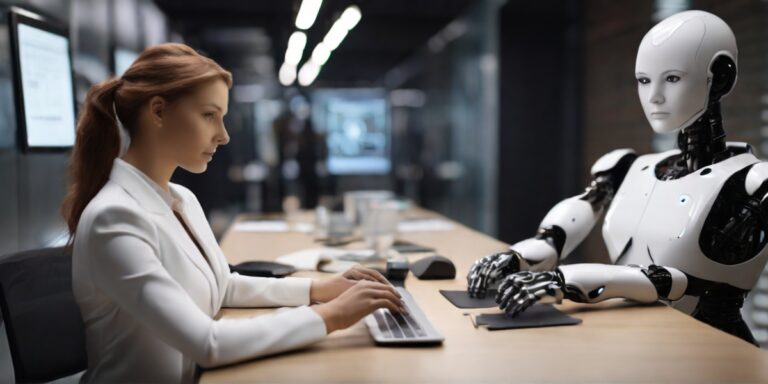
https://www.fuseworkforce.com/blog/12-best-hr-automation-tools-to-save-time-and-moneyUNDERSTANDING HR AUTOMATION AND AI
HR Automation, characterized by the use of technology to perform tasks without human intervention, has already revolutionized various industries, optimizing processes and driving efficiency. Simultaneously, AI, powered by machine learning algorithms, has unlocked capabilities to analyze vast datasets, predict outcomes, and even simulate human-like intelligence in decision-making processes.
The Impact on the Workforce
These technological shifts are reshaping job roles and functions. Routine and repetitive tasks are being automated, altering the skills demanded in the job market. This transformation has led to concerns about job displacement, retraining needs, and the evolving nature of work.
The Rise of New Skills and Job Roles
As HR automation takes over routine tasks, the demand for skills that complement technology is on the rise. Proficiency in data analysis, programming, critical thinking, and creativity becomes increasingly valuable. New job roles such as data scientists, AI ethicists, and digital transformation specialists emerge, reshaping the traditional career landscape.
Addressing Job Displacement Concerns
While HR automation may replace certain job functions, it also creates opportunities for new roles. HR professionals need to focus on facilitating smooth transitions for employees affected by HR automation, providing retraining programs and career counseling to help them adapt to the evolving job market.
EMBRACING CHANGE: HOW HR CAN ADAPT
www.hrtrinity.com
Conducting comprehensive skill assessments to identify the capabilities essential for future roles. Creating tailored training programs and upskilling initiatives will be crucial to aligning the workforce with the demands of an automated environment.
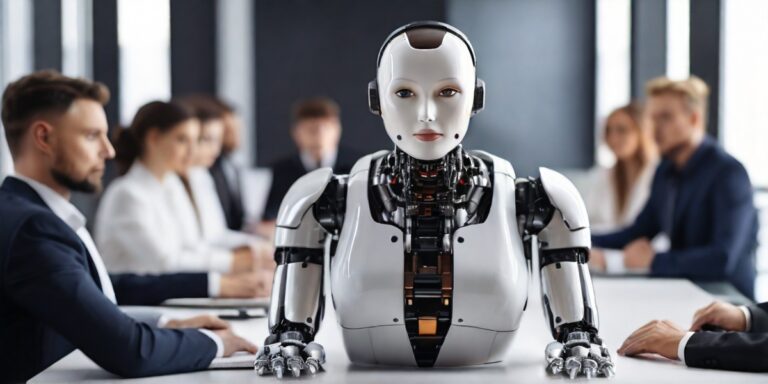
I. Personalized Learning Paths:
Implementing a learning management system that offers personalized learning paths based on employees’ skill gaps and interests. Utilizing AI algorithms, this system recommends courses, modules, or learning materials tailored to each employee’s learning style and career aspirations.
II. Skills Mapping Workshops:
Conducting interactive workshops where employees collaboratively map their current skills against future job requirements. HR, along with departmental heads, helps individuals identify skill gaps and crafts development plans, fostering a sense of ownership in their career growth.
III. Gamified Learning Platforms:
Introducing gamified learning platforms that use AI to adapt content difficulty based on individual performance. By incorporating game elements like challenges, rewards, and leaderboards, employees are motivated to engage with learning materials and track their progress.
Leveraging AI-powered tools to streamline the hiring process, identifying candidates who possess the desired blend of technical skills, adaptability, and critical thinking abilities required in an automated workplace.
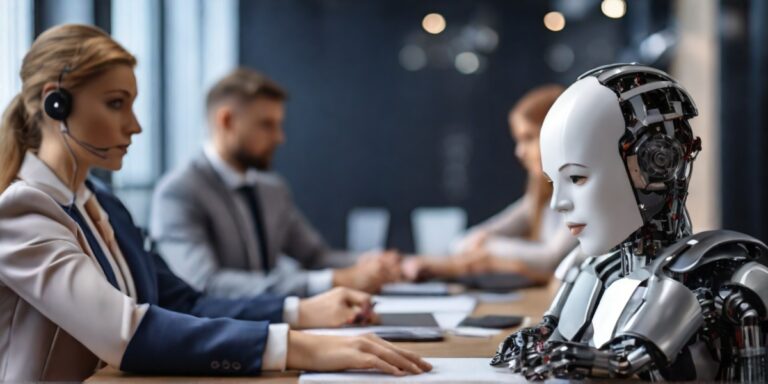
I. Bias-Free Resume Screening:
Leveraging AI-driven resume screening tools that use neutral algorithms to assess candidates. These tools analyze qualifications and experience without considering demographic information, reducing unconscious biases in the initial stages of recruitment.
II. Virtual Job Fairs and AI Interviews:
Organizing virtual job fairs where AI-powered chatbots or interview platforms engage with candidates, assessing skills and cultural fit through predefined questions or scenarios. This allows HR to efficiently screen a large pool of candidates before human interaction.
III. Predictive Analytics for Talent Pooling:
Utilizing predictive analytics to identify potential candidates within existing databases. AI algorithms analyze historical hiring patterns, performance data, and skill matches to predict candidates who are more likely to succeed in specific roles.
Fostering a culture of continuous learning, providing growth opportunities, and emphasizing the human-centric aspects of work that HR automation cannot replicate—such as creativity, empathy, and complex problem-solving.
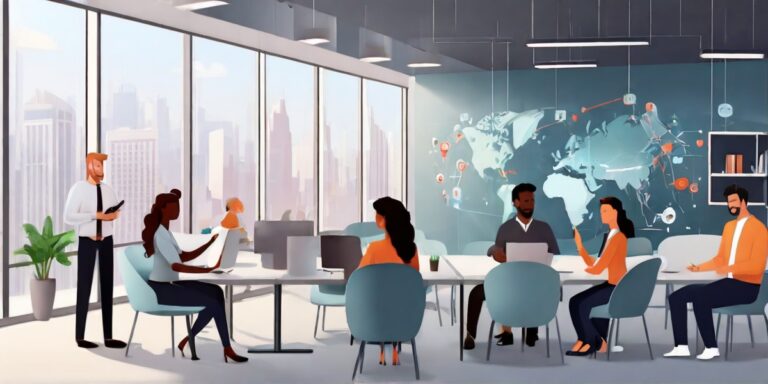
I. Flexibility in Work Arrangements:
Implementing flexible work arrangements or remote work policies to accommodate employees’ changing preferences and work-life balance needs. AI-driven scheduling tools assist in creating customized schedules that suit both the business’s needs and employees’ preferences.
II. Continuous Feedback Platforms:
Introducing AI-driven feedback platforms that collect real-time feedback from employees. These platforms use sentiment analysis to gauge employee satisfaction, allowing HR to proactively address concerns and reinforce positive behaviors.
III. Mentorship Matching Algorithms:
Developing algorithms that match employees with suitable mentors within the organization. Leveraging AI to analyze skills, personalities, and career aspirations, HR facilitates mentorship programs that foster professional development and employee retention.
Effective change management strategies are vital to navigate the workforce through these transformations. HR professionals must communicate transparently, highlighting the benefits of HR automation while addressing concerns and providing support to those affected.

I. Digital Communication Channels:
Implementing dedicated digital communication channels or platforms where HR regularly shares updates, resources, and success stories related to HR automation and AI integration. This ensures that information reaches all employees, fostering transparency and reducing uncertainties.
II. Change Champions Program:
Creating a network of change champions across different departments or teams who act as advocates for HR automation and AI initiatives. These champions receive specialized training and materials to communicate the benefits and dispel misconceptions within their respective groups.
III. Storytelling Workshops:
Conducting storytelling workshops where employees share their experiences and success stories related to adapting to HR automation and AI. HR facilitates these sessions to create a narrative that resonates with employees, emphasizing the positive impact of these changes.
Ensuring ethical use of AI technologies, mitigating biases in algorithms, protecting employee privacy, and preserving the human element in decision-making processes.
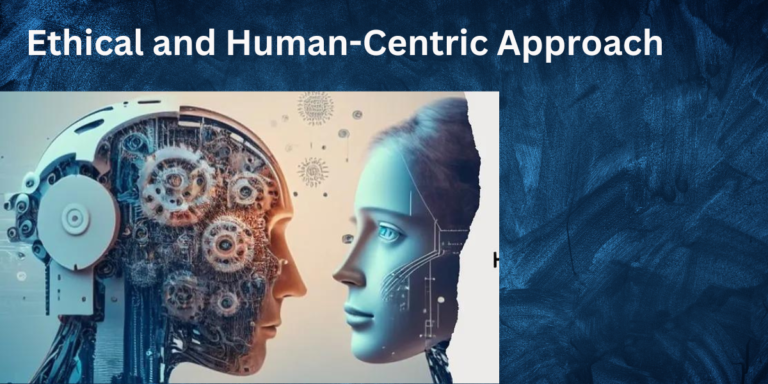
I. Bias Audits and Transparency Reports:
Conducting regular bias audits on AI algorithms used in HR processes and generating transparency reports. HR shares these reports with employees, showcasing efforts to identify and rectify biases, thus fostering trust and transparency.
II. Privacy Impact Assessments:
Conducting privacy impact assessments before implementing new AI-driven HR technologies. These assessments evaluate the potential risks to employee privacy, allowing HR to implement necessary safeguards and communicate transparently about data usage.
III. AI Ethics Committees:
Establishing cross-functional AI ethics committees comprising HR professionals, data scientists, legal experts, and employee representatives. These committees set ethical guidelines, review AI applications, and ensure that decisions align with the organization’s values and ethical standards
In conclusion, the integration of automation and AI into the workforce is inevitable. HR professionals have a pivotal role in guiding organizations through this transition by fostering a future-ready workforce that embraces innovation, continuous learning, and human-centric values. Adapting strategies to harness the potential of these technologies while preserving the essence of human contribution will be the cornerstone of success in the evolving world of work.
Visit www.hrtrinity.com on info@hrtrinity.com for more details.